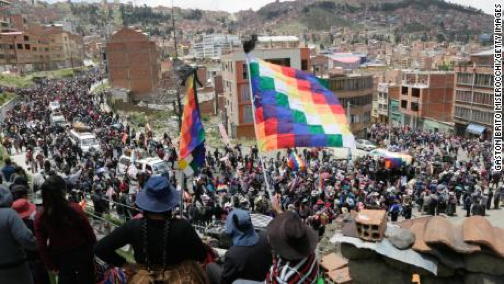
(above) Critics of former Bolivian President Evo Morales claim his resignation was a defense of democracy, but his supporters claim Morales was the victim of a coup.
Bolivia interim president announces peace talks amid renewed fury over deaths
November 23, 2019 - Original article: www.cnn.com
By Stefano Pozzebon, CNN
El Alto, Bolivia (CNN) — Interim Bolivian President Jeanine Añez has agreed to meet with opposition groups Saturday to "bring peace to the country" after weeks of deadly political clashes.
Public Works Minister Yerko Nunez said the meeting will take place Saturday about 4 p.m. (local time) at Palacio Quemado, the presidential residence in La Paz.
The social movements who agreed to the dialogue were organized under the Bolivian Workers' Center, a trade union federation.
The meeting was announced as the Bolivian capital of La Paz has become increasingly isolated after five weeks of violent political clashes that have left more than 30 people dead, according to the country's ombudsman.
Supporters of former President Evo Morales, who stepped down earlier this month after mass protests and at the suggestion of the military, have set up roadblocks across the country and particularly around La Paz. They're demanding the resignation of Añez and calling for Morales to return to power.
"We are going to continue until she's gone," said Lucio Kesper, 65, referring to Añez, while manning one of the blockades in the outskirts of the city.
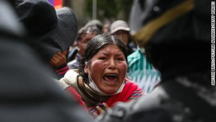 In downtown La Paz, people queue to buy as many groceries as possible in preparation for what could be a long wait before regular supplies are restored. This has happened before; in 2003 and 2005, the capital was cut off for several days during anti-government protests.
In downtown La Paz, people queue to buy as many groceries as possible in preparation for what could be a long wait before regular supplies are restored. This has happened before; in 2003 and 2005, the capital was cut off for several days during anti-government protests.
La Paz, a city of more than 1 million people, lies at the bottom of a deep canyon in the Andean altiplano, or plateau. Surrounding and overlooking the capital is the sprawling sister city of El Alto, which is home to a large indigenous population.
Related Article: Democracy is being tested around the world
Most of the roads that link the capital to the rest of the country pass through El Alto, and its inhabitants can block the supplies and transit as a form of political leverage.
The majority of bus routes connecting provincial capitals to La Paz have been suspended since Tuesday. Flying is now effectively the only way to reach the city.
(below) La Paz citizens are nervous about the looming shortages.
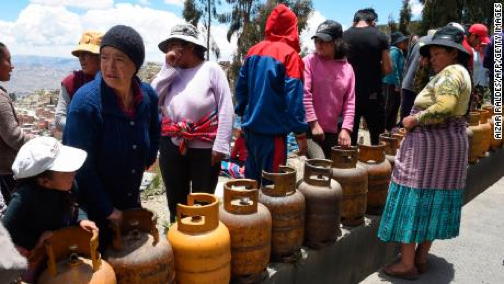
The city's dwindling supplies of gasoline are particularly sensitive. On Thursday morning, public buses to and from the airport were canceled due to a lack of fuel. Gas stations were shut down, and the streets were empty of traffic.
Disputed elections
The situation is the result of disputed presidential elections in October, which took place in a climate of deep mistrust between supporters of Morales, who ruled Bolivia for more than 14 years, and his opponents.
Street protests erupted shortly after the elections, as citizens raised questions over a vote count process that appeared to give Morales another term. An independent report by the Organization of American States (OAS) later found "serious security flaws" in the counting of the vote.
Morales promised to hold new elections, but it was too late — amid ongoing protests and after the chief of the army recommended that he resign, he fled to Mexico, where he has received political asylum.
Añez has since declared herself interim president, despite failing to win the legal minimum of votes from fellow legislators. Her interim administration says it will call new elections within 90 days.
Morales's critics, including the US government, have hailed these events as a democratic success story. But Morales' supporters say that he — the first indigenous president in Bolivian history and one credited with lifting many out of poverty — was the victim of a coup.
They argue that Añez lacks a true mandate to power and that the rule of law can only be restored once she leaves the presidency. "We are just defending democracy," Jony Luna, a 48-year-old of indigenous descent from El Alto, told CNN.
"We are not crazy, or irrational, as they call us. Our fathers fought when they couldn't even read and write, now it is our time to fight, to defend our people and the people of Bolivia," he said.
(below) The government passed a law granting Bolivian security forces broad discretion in the use of force.
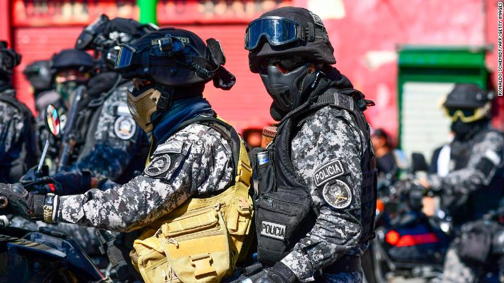
El Alto is one of Morales's historic political strongholds.
Protesters here have resorted to the long-proven tactic of cutting off access to the capital to express their dissent, building roadblocks with stones, half-burned wooden poles and iron fences.
The toll station on the main highway between the two cities was completely sealed by large cement blocks on Thursday. People set piles of garbage on fire to prevent vehicles from driving in, and held vigils throughout the night.
While the citizens of La Paz are more and more nervous for the looming shortages, El Alto is grieving over a clash with security forces which left eight people dead on Tuesday.
"Here we have no weapons, we didn't have even a stick, and the police just shoot at us!" cried out a woman from Senkata, the El Alto neighborhood that experienced the worst of the violence as protesters tried to storm a gasoline storage plant, who asked not to be identified.
(below) Protestors are demanding the resignation of interim president Jeanine Añez
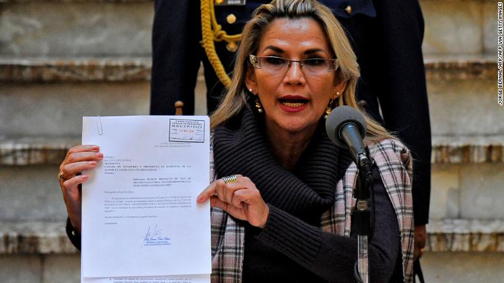
"Where are the ministers? They are not here! They don't come here; they just send the military. But what happens now with the dead ones?" she said. "These are fathers, sons, husbands. Who's going to pay for them? Who's going to look after their families? We need help! Someone must help us!"
"There is a civil war here!" screamed Elena Yughra, 38.
Behind her, graffiti reading "Jeanine, death is forever" was a chilling reminder of the consequences of the country's deep political divide.
"I just want [Añez] to go. From the first day she caused nothing but problems," said Luisa Lejo, 52, adding that she is not afraid of the security forces or the clashes.
On Thursday afternoon, thousands of people marched carrying the coffins of five protesters from El Alto to La Paz.
They were met by security forces firing teargas, and clashes erupted once again.
In the outskirts of the city, people anxiously watched the march's progress, while the detonation of gas canisters could be heard from afar.
Mariana Mamane, a 23-year-old mango seller, told CNN that she finds it more and more difficult to find fruit to sell on the street but that she nevertheless supported the blockades for as long as the interim government remained in power.
(below) Coffins of eight victims were carried from El Alto to La Paz.
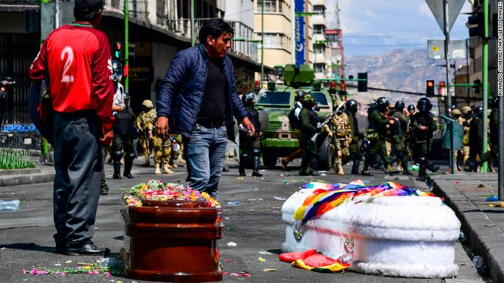
The government has so far proven incapable of lifting the roadblocks. But earlier this month, it passed a law granting Bolivian security forces broad discretion in the use of force — a move criticized by activists worldwide and which only further inflamed the protesters.
The Inter-American Commission of Human Rights has sent a delegation to investigate the deaths, and the Bolivian congress is discussing two competing bills to call for new elections by the end of January.
On Thursday night, Rodolfo Piza, the OAS envoy to Bolivia, urged all sides to commit to free and fair elections as soon as possible.
"We have seen in many cases that elections can become a means of pacification," he said.